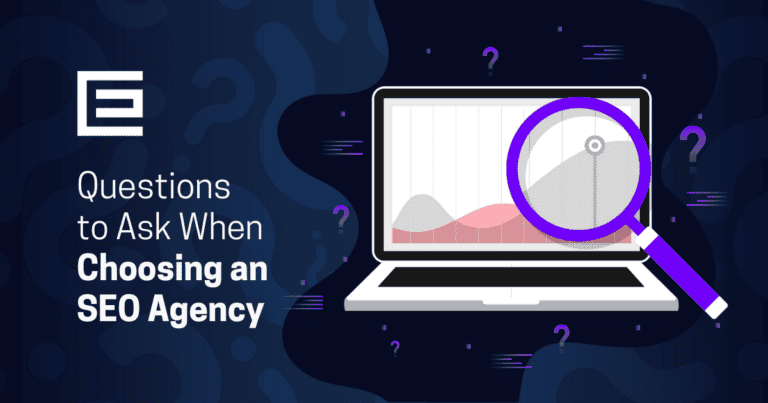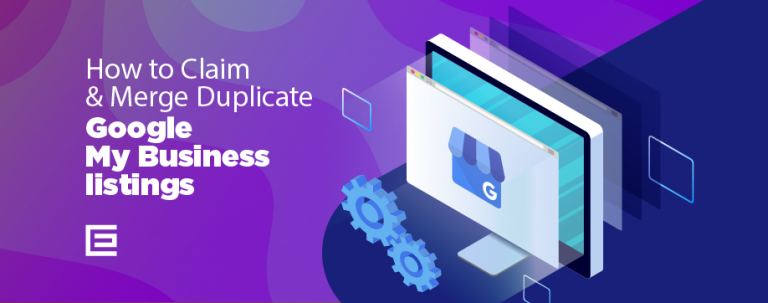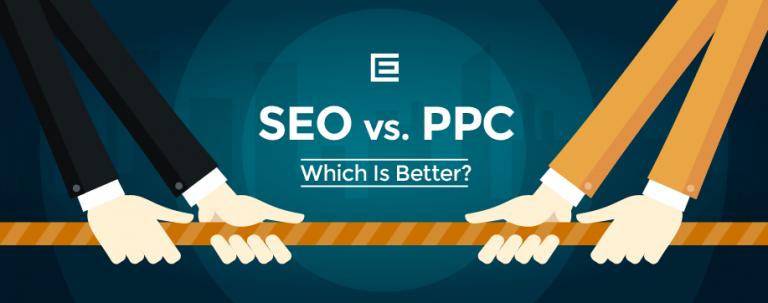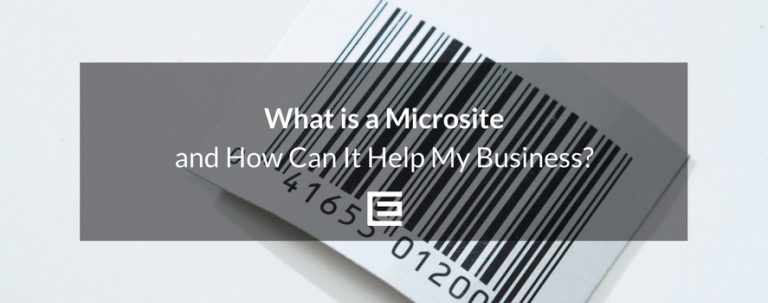Small businesses today spend a lot of time worrying about outranking their competition on Google and other search engines. So, what effect does it have if your website is not ranking within the first three results on Google or, even worse, not even ranking on the first page for your most important keywords? Achieving a high ranking on Google is not an easy task, especially as competition on the web continues to grow. So, how are smaller businesses suppose to compete with more established brands, and larger websites these days?
One of the most effective ways for small businesses to immediately begin competing on a more level playing field is with Pay-Per-Click (PPC) advertising. Small businesses can use PPC to immediately develop brand recognition, maintain a consistent web presence, and introduce a steady flow of new leads and website traffic. Here are six things your business should know to get started with pay-per-click advertising.
1. Pay-Per-Click (PPC) Advertising Defined
Pay-per-click (PPC) is a form of internet marketing in which advertisers pay a fee each time one of their ads is clicked. Essentially, it’s a way of buying visits to your website, rather than attempting to “earn” those visits organically. Primarily PPC advertising is run on search engines, such as Google AdWords and Bing Ads as well as social media platforms like Facebook, Instagram, Twitter, LinkedIn, and Pinterest.
Pay-per-click advertising terms may also include:
- PPC advertising
- Paid search
- PPC marketing
- Paid search marketing
- Search engine marketing – SEM
Google, Bing, and Yahoo allow advertisers to bid for placement of their advertisements, which are typically featured at the top and bottom of the search results.
For example, a search of a plumber in Raleigh will yield the following Google results, which include the top four paid search results.
Google AdWords Example
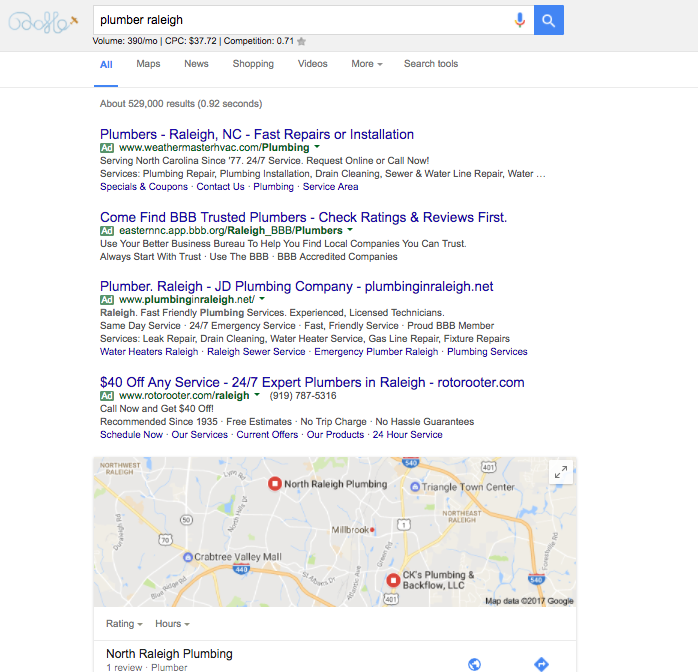
Social media platforms like Facebook, Pinterest, and Instagram on the other hand allow for display ads to be placed on their platforms in a user’s activity feed. With Facebook advertisers have the ability to create responsive ads for desktop as well as for mobile devices. These platforms can vary greatly when it comes to the style and content of the ads.
Facebook Ads will appear in news feeds or be displayed in the right column of the page on desktop and laptop systems. In addition, Instagram accounts can now be added to a businesses Facebook page, which will allow them to create Instagram ads directly from their Facebook Ads console.
Facebook is the most advanced and robust of all the social media platforms for advertising. Facebook also includes some of the more advanced features like pay-per-impression and ad retargeting (we have all seen those Amazon ads that stalk you all over the Internet). Facebook also has almost 1.7 billion users worldwide.
2. Benefits Small Businesses Get From PPC Advertising?
Almost any small business can benefit from using a pay-per-click marketing strategy to generate leads, sell product or service or build its web presence. The keys to being successful are targeting relevant keywords, understanding your target audience and developing a sound strategy.
Here are some key benefits of PPC for small businesses:
- High-Profit Margins – Products and services with a high-profit margin may be able to pay more per click. Some examples include dentists, lawyers, home renovations, vehicles, or other big ticket items.
- Niche Products – Products or services that are difficult for buyers to find locally can also make your business a great candidate for PPC advertising campaigns.
- Measurable Results – With PPC you can measure everything related to your campaign including costs, profits, views, clicks, visitors and more.
- Demographics – PPC advertising also allows you to choose specifically when and where your ads will appear based on things like keywords, location, website, device, time and date and much more. With this type segmentation, it allows you to show your products and services to the right audience at the right time.
3. What Should Your PPC Strategy Be?
There is no one-size-fits-all strategy when it comes to PPC, so depending on what your product or service is, there are many factors that go into developing an effective ad campaign. Deciding on whether to advertise on a social media platform or a search engine platform or a combination of both will be one of the first decisions you will have to make in determining the strategy of your campaign.
Having a basic understanding of the PPC process will help small businesses get started, however, in most cases in order to get the highest return on your investment (ROI) additional knowledge and the assistance of a marketing specialist should be sought.
Before you start a paid search marketing campaign it is very important to develop a campaign strategy along with a budget. Ask yourself the following questions:
- What is your objective?
- What are your keywords?
- How many ads do you want to run?
- What is your budget?
Once you have determined your campaign strategy, it’s time to either create a text, image, or video ad and then publish it to your preferred PPC account. As you create your ads you will be able to specify the following criteria:
- Start and stop dates
- Keywords
- Maximum CPC (cost-per-click) price
- Audiences by demographic and other filters
- Geographic settings
- Various other settings
Once your ad has been approved and is published, it’s time to manage the campaign. It’s always recommended that you check your dashboard frequently to monitor progress and then make adjustments to the campaign as they are needed. PPC is not something you should just put on auto-pilot.
4. Which Search Engine Advertising Platform Is Right For My Business?
When small businesses decide to pay for advertising on search engines they are looking to take advantage of consumers who already know what they want and are actively searching for your business or someone like your business.
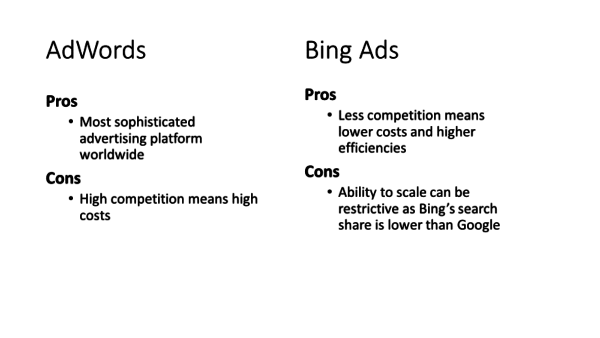
The most popular search engine PPC advertising platforms today are Google Adwords and Bing Ads. As paid search continues to grow, the more competitive this landscape becomes for advertisers, which can make it more difficult for smaller businesses to compete due to the increased cost-per-click (CPC). However, Google and Bing are certainly not the only options out there for small businesses these days. Here are some additional ad platforms to consider:
- Google is the largest and most popular search engine, with more than 68% of the overall search traffic online today. It is also the most competitive. Therefore, it is important that small businesses really research their target keywords to be able to rank for them at an affordable price.
- Bing is the second most popular search engine currently has an 18% market share on paid search engine advertising, which also includes ads displayed on Yahoo, through a partnership agreement. Small business may find that the cost of advertising on Bing will be less than would be on Google in many cases and will their ads will also display on two search engines.
- Yelp Ads are a popular way for small businesses to target specific local, region, or national markets with ads that can appear on searches as well as on competitor pages. These ads can be very effective for small businesses because they encourage engagement and direct response through reviews and sharing.
- Facebook provides small businesses with a healthy amount of conversions through their model. Advertisements that are displayed on Facebook are inserted into a user’s timeline as a “sponsored” ad. Due to the high volume of users on this platform advertisers can see a great amount of engagement with their ads.
5. Which Pay-Per-Click Social Media Advertising Platforms Should I Use?
Facebook and other social media users are a demand seeking generation. When users scroll through their newsfeeds, they are much more open to discovering something new, whether that’s a new idea, product, service, or business. Therefore, social media can be a great place to introduce your business, service or brand to an eager audience.
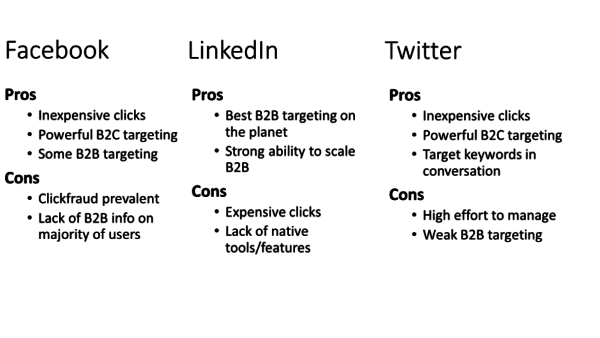
Facebook is by far the most popular social media platform for PPC advertising, but there are, however, a number of other options available. Social media platforms vary when it comes to audience size, demographic reach, and cost, so a bit of research can go a long way when it comes to selecting the appropriate platform. When developing a social pay-per-click advertising strategy, you may want to consider these options:
- Instagram – This platform is great for small businesses that can easily convey their powerful messages using imagery.
- YouTube – If your business uses video to communicate effectively, then you may find tremendous success on YouTube.
- Twitter – Twitter is a platform that can help all types of small business increase their exposure, share content, craft a brand voice, or offer deals to their followers via advertising.
- LinkedIn – If you are trying to reach a more professional audience, then LinkedIn may be the platform for your business. Many business-to-business (B2B) enterprises find success using LinkedIn advertising.
- Pinterest – Small businesses that primarily target women typically find a great amount of success with Pinterest advertising, which features both a website as well as a mobile app.
- Snapchat – Businesses who are looking for specific calls to action, or like to make business announcements and exciting press releases could use Snapchat in their marketing mix.
Each platform has its pluses and minuses and by creating a strategy that incorporates multiple platforms, your small business can increase its chances of reaching a higher converting audience.
6. Paid Search vs. Paid Social?
Small business that can find a way to incorporate the strengths of both search engine and social media pay-per-click will have a definite advantage when it comes to a paid advertising strategy. Understanding the difference and when to use each platform will help to increase the visibility for your business while decreasing your cost at the same time.
- Paid Search – Search is intent based and small businesses can market to potential customers based on target keywords. You can also target customers that are closer to the bottom of the sales funnel, such as “buy running shoes.” This allows your business to give that customer exactly what they are asking for. Search engines also provide the largest audiences available on the internet. The top search engines prioritize well-constructed, relevant ads to create a good experience for the user. This means that small businesses, with smaller budgets, can be just as competitive as companies with bigger budget campaigns if they do things correctly.
- Paid Social – Social, on the other hand, does not give small businesses the ability to target people based on intent. However, where social shines, is with its ability to target highly specific audiences by personal, professional, demographic and psychographic segments. This advanced segmentation allows small businesses to use PPC to position ads with higher conversion rates to those individuals who are most relevant and able to purchase from them.
When used correctly paid search and paid social can easily complement one another to form a well rounded PPC advertising campaign.
Conclusion:
Developing a comprehensive pay-per-click advertising strategy isn’t the easiest thing to do, but it is manageable. In order to get the best ROI within a short time frame, it may be a good idea to seek out a professional who specializes in PPC marketing. If your small business is not in a position to outsource paid search marketing, it is important to perform thorough research before diving in.
Launching and enhancing your website is only the first step. Implementing an ongoing marketing strategy that encompasses Pay-Per-Click advertising is an important part of the equation when it comes to small businesses successfully navigating the digital landscape. By not incorporating PPC as part of your businesses overall marketing strategy you are leaving money on the table for your competitors. If any part of your PPC advertising efforts feels overwhelming or confusing please feel free to reach out to our team for more assistance.
How do you handle Search Engine Marketing for your business? Let us know on Twitter or Facebook!
Tags: Paid Search Marketing

